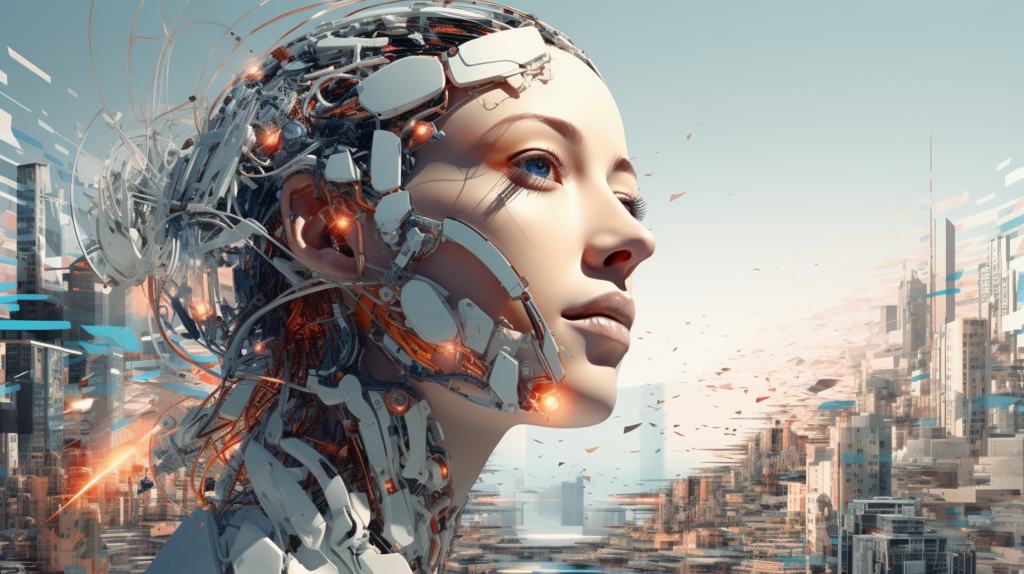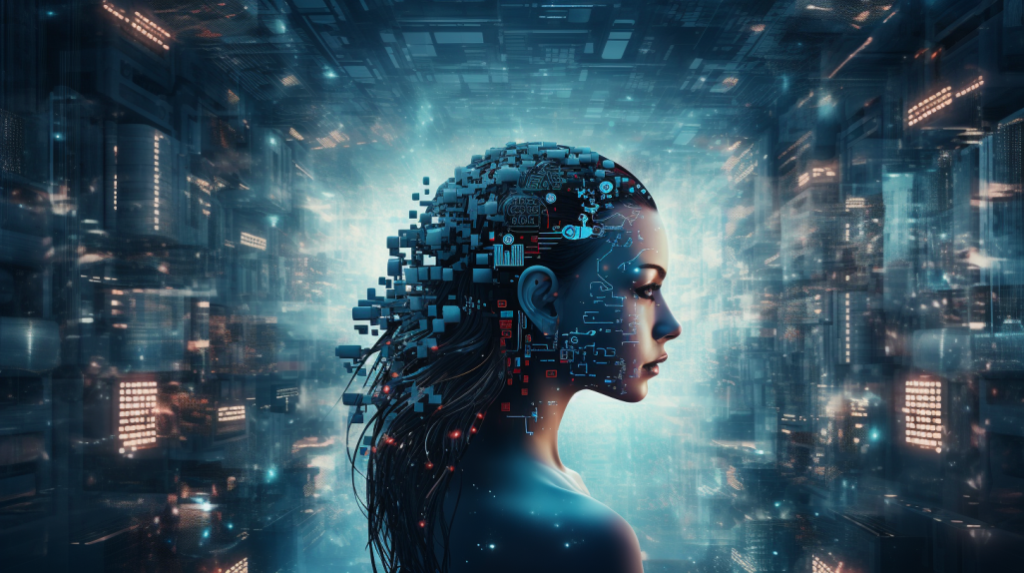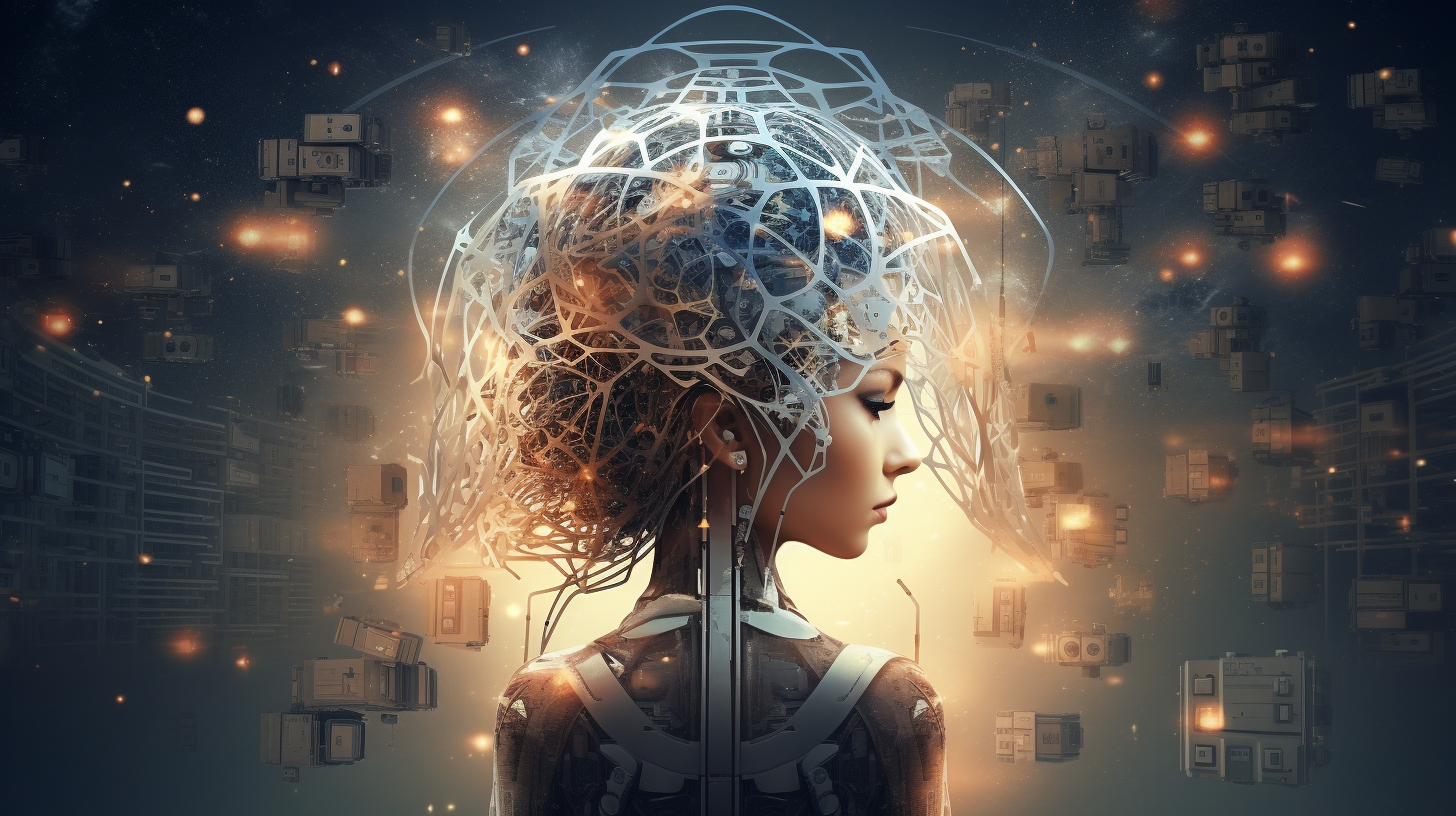Artificial Intelligence (AI) is highly transforming the social media landscape, creating new opportunities for businesses. From AI-powered chatbots to personalized content recommendations, this advanced technology is reshaping the way businesses engage with their customers, evaluate their online presence, and optimize their social media marketing strategies.
In today’s fast-paced world, social media platforms dominate the digital landscape and play a crucial role in our daily lives, connecting businesses, people, and ideals globally. AI in Social Media has the potential to change how brands market across platforms like Facebook, Twitter, Instagram, TikTok, and LinkedIn.
With the massive growth in social media users and content, there is an increasing demand for AI solutions to understand consumer preferences. The AI market in social media is expected to expand from $1.64 billion in 2023 to $5.66 billion by 2028, achieving a CAGR of 28.04%.
In this article, we’ll explore the rise of AI in the social media landscape, future AI trends, challenges of using AI in social media, and strategies to address the challenges. From the influence of AI in content recommendation algorithms to influencer marketing and brand partnerships, we will cover everything you need to know about the role of AI trends in revolutionizing the social media landscape entirely.
Let’s dive into the details!
The Impact of AI on Social Media Landscape in 2023
In 2023, we are witnessing the significant impact of AI on how we communicate, advertise, and consume content on social media platforms. AI in social media refers to AI-powered tools and services that users can utilize to save time, boost engagement, and stand out on social media.
AI-driven social media is supporting businesses by providing automated content creation, enhanced engagement opportunities, and conversion-focused advertising. One of the significant impacts of AI is that brands can use this revolutionary technology to produce personalized and customized content that resonates with their targeted audience.
In addition, AI tools help elevate the features of social media platforms and manage social media activities across various use cases, including content creation, ad management, social media monitoring, influencer research, and enhancing customer support experience by using AI-powered chatbots.
AI Trends Transforming the Social Media Landscape
Here are the top AI trends that are transforming the social media landscape in 2023.
Text and Visual Content Creation
Generative AI tools have been one of the exciting trends in recent years, which use text-to-image, image-to-image, image-to-video, and other algorithms to create original content like text, images, and videos. These tools can produce engaging and relevant content such as blogs/articles, social media posts, and captions. Moreover, AI-powered design tools create on-point graphics for posts, advertisements, and websites by analyzing user preferences, target audience, and prior design history.
Content is king on social media, and Artificial Intelligence has made it easier to create and curate unique content. AI-driven content creation is transforming content marketing and becoming more sophisticated by creating captivating visuals and videos. By leveraging AI-generated content, brands can save time and money while focusing on other essential aspects of marketing strategy.
Real-time Brand Reputation Monitoring
AI-powered tools can monitor social media platforms and instantly alert brands when their products or services receive negative feedback. Previously, companies had to manually go through social media posts to determine the customers’ views and perceptions. In this digital era, AI-powered social media tools can analyze thousands of posts to identify trends and insights. This ability to instantly and properly analyze public sentiments is more than crucial.
Furthermore, social listening tools such as sentimental analysis can help businesses figure out emerging trends in their industry. Through these tools, businesses can monitor the social media conversations about their brands to gain insights into what their consumers are talking about, what they like, what they dislike, and what they expect from your brand. Such information can assist businesses in spotting potential problems, developing products that meet the needs of customers, and staying ahead of the competition.
Targeted Social Media Advertising
AI’s role in advertising is revolutionizing social media marketing. AI examines user data to offer insights into consumer behavior, allowing brands to create targeted ad campaigns. Additionally, AI is able to provide personalized promotions, generate product recommendations, and target ads to ideal audiences. These features improve user experience, make ads more relevant, and boost conversion rates.
Moreover, marketers can optimize ad spending with AI to ensure their budgets are allocated to the best campaigns, platforms, and target audiences.
Another significant impact of AI in social media is that it enhances user experience and personalization by providing specialized content recommendations and promotions. With the development and sophistication of AI technology, this trend is set to last.
AI-Powered Chatbots and Customer Support
Customers now expect instant solutions to their problems. This is where AI-powered chatbots come into play, quickly responding to customer concerns and transforming customer support services. AI-powered chatbots have revolutionized customer engagement on social media.
In 2023, businesses have incorporated chatbots in their customer service efforts to provide instant responses, handle routine tasks, and even offer personalized recommendations to each customer. This not only increases customer satisfaction but also reduces response times and ensures businesses are available to help customers round the clock. In addition to assisting clients to find rapid solutions to their concerns, these chatbots save valuable time and resources for businesses.
Influencer Marketing Optimization
AI has a significant impact on influencer marketing. Finding the perfect influencers is one of the key factors in any influencer marketing campaign’s success and can help a brand gain massive recognition. AI algorithms can find the right influencers for your brands by analyzing their followers, engagement rate, and content relevancy metrics.
With the right strategy, AI-driven influencer marketing can help businesses expand their customer base, elevate brand awareness, and optimize their social media marketing efforts. Other helpful applications of AI technology in influencer marketing include:
- Identifying fake influencers.
- Evaluating and calculating campaign ROI.
- Choosing the most meaningful content for each campaign.
Influencer marketing has grown to be a crucial aspect of brand partnerships, and it has proved to be a successful strategy for brands to connect with target audiences and drive sales. So, AI is playing a significant role in revolutionizing this marketing strategy.
Let’s explore the role of AI in the transformation of influencer marketing.
The Role of AI in Influencer Marketing and Brand Partnerships
Influencer marketing is an excellent way for brands to connect with customers through influencers. Brands may reach a larger audience and improve visibility by collaborating with influencers with large social media followings. However, finding the right influencers, developing engaging content for campaigns, and tracking the campaign process is a costly and time-consuming process. This is where AI comes into play.
When it comes to the role of AI in influencer marketing, it takes the game to a whole new level.
Identify Right Influencers: First and foremost, AI algorithms analyze social media platform datasets of influencers, such as follower demographics, engagement rates, and content relevancy. This information helps identify potential influencers whose following matches the brand’s target audience.
Content Recommendations: AI also plays a significant role in content recommendations. It suggests content ideas that align with both the influencer’s style and the brand’s values.
Content Generation: One of the beneficial applications of AI-powered tools in influencer marketing is that they help influencers create content more quickly, such as producing engaging captions, editing images, and writing blog posts.
Performance Tracking and Measurement: AI-driven analytics tools provide real-time performance data on influencer campaigns. It includes monitoring engagement rates, click-through rates, reach, and conversions.
With all these valuable functions, AI highly benefits marketers and brands. Let’s look at AI’s benefits in influencer marketing and brand partnerships.
Benefits of Implementing AI in Influencer Marketing
Incorporating AI technology in influencer marketing offers several benefits that can make a massive difference for your business. Here are some of the key benefits of AI in influencer marketing:
Saves Time and Cost
The ability to save time and resources is one of the most important advantages of employing AI. High-quality content creation can be a time-consuming and expensive process, but AI can quickly and automatically generate content without the need for human involvement. This allows marketers and content producers to focus on other campaign elements like strategy and research while producing exciting content.
Prevent Influencer Fraud
AI tools can verify the authenticity of influencers, helping brands spot phony or bot-driven accounts. This lowers the risk of partnering with influencers who might falsely inflate their follower counts.
Also, AI systems can identify suspicious engagement patterns, such as abnormally high likes or comment rates compared to the number of followers.
Scalability
Depending on the demands of the marketing campaign, AI-generated content can be scaled up or down. AI can be used to produce high-quality content rapidly for brands who need to publish a large volume of material. This can be especially helpful for seasonal marketing campaigns, product launches, or other time-sensitive events.
Optimization
Another benefit is that it is possible to optimize AI-generated content for a variety of platforms and search engines, ensuring that a vast number of people can see it. This could increase visibility, drive large traffic, and boost the SEO of the brand’s website.
Personalized Content Generation
One of the most incredible benefits of AI is that it can create personalized content. AI-generated content can be customized for particular audiences, increasing its effectiveness in attracting new clients. This advanced technology makes tailored content that appeals to specific consumers by analyzing their behavior, preferences, and other data. Personalization can boost conversion and engagement rates, leading to increased revenue.
If you’re wondering how AI creates personalized content that meets audience needs and expectations, read on to find the answer!
How AI Helps Marketers and Content Creators Create Personalized and Engaging Content
With the help of Natural Language Processing and Machine Learning algorithms, AI creates personalized and engaging content that aligns with individual consumers. Here is how AI helps generate personalized content.
Audience Analysis
AI can examine a lot of data to learn about consumer content preferences and behavior. By utilizing this information, customized content can be produced.
AI, for instance, can analyze search data to determine what kinds of products or services consumers are looking for and use that data to create highly targeted advertisements or product recommendations.
Personalized Content Recommendations
AI can also suggest content ideas and themes to users by using data on consumer behavior and needs. Customers are more likely to interact with information that is relevant to their interests, which can help maintain their interest in the business. And AI generates content that resonates with the influencer’s audience and audience interests.
Advanced Sentimental Analysis
AI produces content that sounds natural by analyzing user sentiments and perceptions. By doing sentimental analysis, AI is able to create customized emails, social media posts, or product descriptions that are catered to specific customers. Sentimental analysis shows whether the consumer is angry, frustrated, or satisfied with the product. It helps marketers create content as per customer expectations.
Chatbots
AI-powered chatbots are widely used to communicate with customers in real-time, offering personalized recommendations and support. This could improve customer engagement, increase response times, and foster brand loyalty.

Challenges of AI in Social Media
AI has brought huge advancements to the world of social media, but it also comes with challenges that businesses must be aware of and address timely. Here are some challenges and potential risks of incorporating AI in social media.
Data Privacy and Security
AI algorithms rely on a lot of data to work successfully, which can be a security issue if left unprotected. It could lead to data breaches, which might harm the brand’s reputation. Also, it is crucial if you deal with sensitive consumer data such as banking details, healthcare data, or personal information.
In terms of data security, cyberattacks can target the enormous datasets that are used to train AI models. Ensuring the security of these databases and AI systems themselves is a huge challenge. So, data privacy and data security regulations should be followed when such data is collected, stored, and processed.
Lack of Authenticity
AI’s ability to produce content quickly comes with the risk of lacking authenticity and spreading false information. Although AI tools have the potential to be highly accurate, they aren’t. They are prone to make up facts, statistics, and other information. Additionally, users are becoming more savvy and can identify when content is AI-generated or human-generated. Consequently, a brand may suffer loss of credibility and trust.
Limited Creativity
AI is highly effective at generating content following a specific formula and existing data, but it lacks human creativity and the ability to produce innovative content. This limited creativity can result in a loss of competitive advantage and a lack of differentiation. In addition, AI content lacks empathy and emotional intelligence, which makes it challenging to produce content that connects with users on a deeper level.
Regulatory Compliance
Managing the complex landscape of regulations and assuring compliance for social media companies is challenging. Since AI in social media is new, many businesses are still determining when, where, and how to employ it.
Therefore, checking with your legal and compliance departments before employing AI-generated content or granting bot permission to engage with clients online is crucial. This will help brands stay clear of any potential conflicts or violations of rules for your industry.
Legal and Ethical Issues
Another ongoing challenge is ensuring that AI is used ethically in social media. In a few cases, AI can be used to invade privacy, target vulnerable groups, and manipulate consumer behavior. So, businesses must be aware of potential ethical and legal considerations of using AI technology. They should strike a proper balance when deciding what content to promote or remote, and decisions should be aligned with ethical and societal norms.

Strategies to Navigate the Challenges of AI in Social Media
To address these concerns and ensure you are using AI social media safely, here are expert strategies:
- Comply with data protection regulations before implementing any AI solution.
- Be transparent about AI usage and give your audience a clear understanding of how their data is used to enhance their online experiences and when and how your brand uses AI tools.
- Always double-check and validate your content before publishing to avoid unintentional copyright violations.
- Measure customer feedback regularly to see how customers are reacting to AI-generated content and AI solutions and identify areas of improvement.
- Recognize the limitations of AI technology, add a human touch to tech-savvy experiences, and avoid overreliance on automation.
- Last but not least, train your team about AI, its latest trends, and a thorough understanding of tech. Also, they should devote time regularly to tracking, updating, and troubleshooting AI social media tools.
Wrapping Up
The future of social media is undoubtedly AI-powered. Artificial Intelligence (AI) and social media go hand in hand to enhance marketing operations and deliver better user experiences. From content creation and personalization to influencer marketing and social media monitoring, AI holds the potential to transform how brands market on social networks and help them get more value from social media activities.
The rise of AI-powered tools has already had a massive impact on the social media landscape, and this impact will only get more prominent in the future. With the evolution of AI, brands that can leverage the power of this revolutionary technology will succeed.
Want to stay updated with the latest AI news and trends? Please explore our blog for in-depth information about this revolutionary technology!





Comments 1